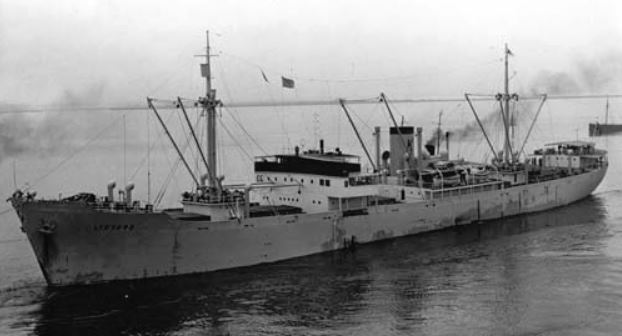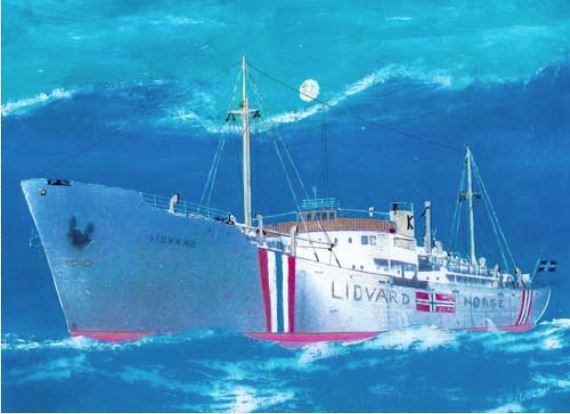Difference between revisions of "SS Lidvard"
From Our Contribution
| Line 1: | Line 1: | ||
{{Infobox ship | {{Infobox ship | ||
| image = [[File:SS_Lidvard.jpg]] | | image = [[File:SS_Lidvard.jpg]] | ||
| − | | caption = | + | | caption = ''Lidvard'' at Dublin, Ireland in 1954 |
| − | | image2 = [[File:.jpg]] | + | | image2 = [[File:SS_Lidvard_1.jpg]] |
| − | | caption2 = | + | | caption2 = Painting depicts ''Lidward''s paint job to represent her neutralty |
| shipname = SS Lidvard | | shipname = SS Lidvard | ||
| shipowner = Klosters Rederi A/S | | shipowner = Klosters Rederi A/S | ||
| Line 30: | Line 30: | ||
==Remarks== | ==Remarks== | ||
| − | On 30 May 1940 the SS Lidvard arrived in Dakar from Saigon with a cargo of rice and was interned by the French forces there. On 27 Jul 1941 Lidvard made history when, through ingenious workmanship and planning, she escaped from Dakar, and after a nerve racking voyage she made it safely to Freetown on July 29 (the Vichy French patrol boat ''Edith Germaine'' was sent out to look for her, but could not catch up with her). | + | On 30 May 1940 the SS Lidvard arrived in Dakar from Saigon with a cargo of rice and was interned by the French forces there. Between october 1940 and 22 Jun 1941 three separate groups of crew escaped from Dakar in lifeboats. A total of 20 crew from the ""Lidvard'' were engaged in this escapes. On 27 Jul 1941 ''Lidvard'' made history when, through ingenious workmanship and planning, she escaped from Dakar, and after a nerve racking voyage she made it safely to Freetown on July 29 (the Vichy French patrol boat ''Edith Germaine'' was sent out to look for her, but could not catch up with her). |
| − | Lidvard was leased by Nortraship to the Australian Army Transport Corps very soon after her escape from Dakar and spent the rest of the war mainly on Australian coastal trade, including New Guinea. | + | ''Lidvard'' was leased by Nortraship to the Australian Army Transport Corps very soon after her escape from Dakar and spent the rest of the war mainly on Australian coastal trade, including New Guinea. She undertook similar work for the rest of 1946. ''Lidvard'' was sold to Henriksens Rederi, Oslo in December 1954, renamed ''Brede'', and then sold to the Bulgarian Government in May 1965, renamed ''Opal''. Renamed ''Tzanko Tzerkovski'' in 1970, she was scrapped in Yugoslavia during 1976. |
==Soldiers carried== | ==Soldiers carried== | ||
| Line 41: | Line 41: | ||
===Rabaul, New Britain to Brisbane 9 - 14 February 1946=== | ===Rabaul, New Britain to Brisbane 9 - 14 February 1946=== | ||
| − | *[[Herbert Bunney]] | + | * [[Herbert Bunney]] |
| + | |||
[[Category:Ships]] | [[Category:Ships]] | ||
Revision as of 01:26, 6 December 2021
Contents
Remarks
On 30 May 1940 the SS Lidvard arrived in Dakar from Saigon with a cargo of rice and was interned by the French forces there. Between october 1940 and 22 Jun 1941 three separate groups of crew escaped from Dakar in lifeboats. A total of 20 crew from the ""Lidvard were engaged in this escapes. On 27 Jul 1941 Lidvard made history when, through ingenious workmanship and planning, she escaped from Dakar, and after a nerve racking voyage she made it safely to Freetown on July 29 (the Vichy French patrol boat Edith Germaine was sent out to look for her, but could not catch up with her).
Lidvard was leased by Nortraship to the Australian Army Transport Corps very soon after her escape from Dakar and spent the rest of the war mainly on Australian coastal trade, including New Guinea. She undertook similar work for the rest of 1946. Lidvard was sold to Henriksens Rederi, Oslo in December 1954, renamed Brede, and then sold to the Bulgarian Government in May 1965, renamed Opal. Renamed Tzanko Tzerkovski in 1970, she was scrapped in Yugoslavia during 1976.

